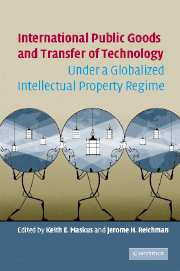Book contents
- Frontmatter
- Contents
- List of contributors
- Preface
- PART I International Provision of Public Goods under a Globalized Intellectual Property Regime
- 1 The Globalization of Private Knowledge Goods and the Privatization of Global Public Goods
- 2 The Regulation of Public Goods
- Comment: Norms, Institutions, and Cooperation
- 3 Distributive Values and Institutional Design in the Provision of Global Public Goods
- 4 Koyaanisqatsi in Cyberspace: The Economics of an “Out-of-Balance” Regime of Private Property Rights in Data and Information
- 5 Linkages Between the Market Economy and the Scientific Commons
- Comment I: Public Goods and Public Science
- 6 Sustainable Access to Copyrighted Digital Information Works in Developing Countries
- 7 Agricultural Research and Intellectual Property Rights
- Comment II: Using Intellectual Property Rights to Preserve the Global Genetic Commons: The International Treaty on Plant Genetic Resources for Food and Agriculture
- PART II Innovation and Technology Transfer in a Protectionist Environment
- PART III Sectoral Issues: Essential Medicines and Traditional Knowledge
- PART IV Reform and Regulation Issues
- Index
6 - Sustainable Access to Copyrighted Digital Information Works in Developing Countries
Published online by Cambridge University Press: 05 May 2010
- Frontmatter
- Contents
- List of contributors
- Preface
- PART I International Provision of Public Goods under a Globalized Intellectual Property Regime
- 1 The Globalization of Private Knowledge Goods and the Privatization of Global Public Goods
- 2 The Regulation of Public Goods
- Comment: Norms, Institutions, and Cooperation
- 3 Distributive Values and Institutional Design in the Provision of Global Public Goods
- 4 Koyaanisqatsi in Cyberspace: The Economics of an “Out-of-Balance” Regime of Private Property Rights in Data and Information
- 5 Linkages Between the Market Economy and the Scientific Commons
- Comment I: Public Goods and Public Science
- 6 Sustainable Access to Copyrighted Digital Information Works in Developing Countries
- 7 Agricultural Research and Intellectual Property Rights
- Comment II: Using Intellectual Property Rights to Preserve the Global Genetic Commons: The International Treaty on Plant Genetic Resources for Food and Agriculture
- PART II Innovation and Technology Transfer in a Protectionist Environment
- PART III Sectoral Issues: Essential Medicines and Traditional Knowledge
- PART IV Reform and Regulation Issues
- Index
Summary
Introduction
Intellectual property rights are an important part of the regulatory environment necessary to promote and support economic growth in the digital age. Recent gains in productivity growth in leading developed countries are strongly related to investments in information technology and correlate with the extent to which such technology, or technology-driven goods and services, are diffused throughout the economy. Attaining adequate levels of technology investment and diffusion requires a policy framework that prioritizes research, enhances competitiveness and facilitates the flow of knowledge among firms. Granting property rights in the fruits of innovative and creative endeavor has long been the policy tool of choice to accomplish these objectives. Incessant demands by the information industry and other proprietors of creative works for stronger global protection have been rationalized as a condition for maintaining adequate levels of innovation, competition and cross-border investment.
The emphasis on information technology as a major contributor to economic growth further consolidated industry influence over intellectual property policy, and provided a gloss for the pervasive pattern of rent-seeking that has characterized contemporary innovation policy in the developed countries. The concerted efforts of the knowledge industries were largely responsible for the extraordinary conclusion of the Agreement on Trade-Related Aspects of Intellectual Property Rights (TRIPS Agreement), which established a global baseline to usher the developing world into a worldwide system of heightened protection for intellectual property.
- Type
- Chapter
- Information
- International Public Goods and Transfer of Technology Under a Globalized Intellectual Property Regime , pp. 142 - 187Publisher: Cambridge University PressPrint publication year: 2005
- 4
- Cited by

